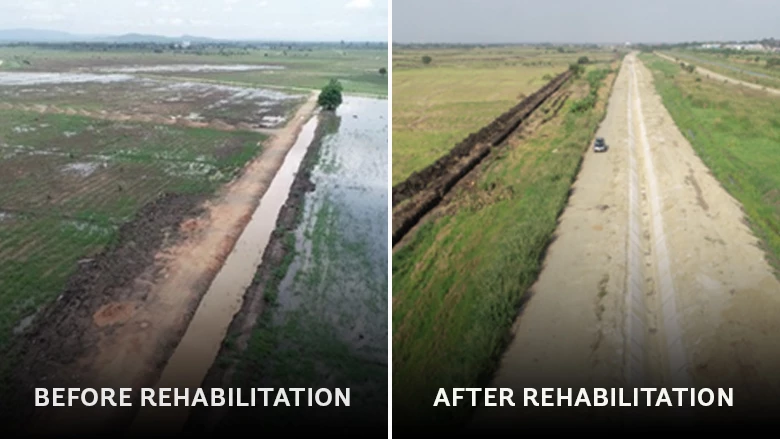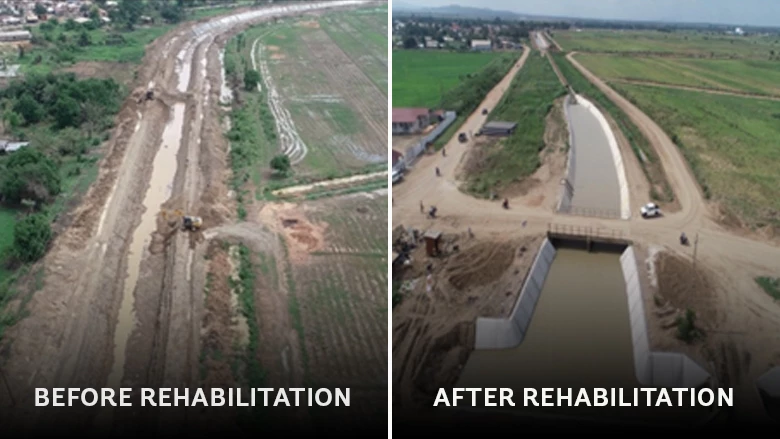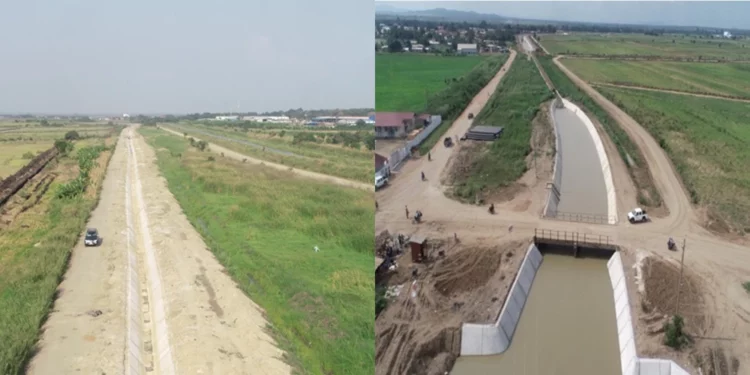Delivering irrigation for enhanced productivity and climate resilience in Ghana
“ Previously, not all of us could get water on our farms, because there were no water control structures. The project installed valves on the piped canals which open to the individual fields, and we were trained on the use of the water management structures. We were also guided to prepare an irrigation schedule, so everyone is able to get water at the planned times.”
Climate change poses unprecedented challenges to Ghanaian agriculture. It reduces the predictability of rainfall, increases temperatures, and lengthens the duration of dry periods. A lack of access to irrigation stifles the resilience of agriculture in Ghana. The country possesses substantial irrigation potential: with estimates of irrigable land spanning from 360,000 to 1.9 million hectares although less than 3% of cultivated land is irrigated.i Consequently, farmers bear the brunt of shifting weather patterns and extreme events as the farming system is predominantly rain-fed
“Most times, there was no water, especially during the dry season. Also, because of the poor state of the canals, water did not reach all the farms. Now that the scheme has been repaired, we get water to our fields all the time, and we are able to cultivate at least two times in a year.”
Felix Akonagam, Rice Farmer, Tono Irrigation Scheme
Delivering public infrastructure and complementary public goods to boost smallholder farmers’ productivity and resilience is at the heart of the World Bank’s response to farmers’ vulnerability to climate change. In Ghana, the Ghana Commercial Agriculture Project (GCAP) saw tangible and long-lasting impacts. The project reached 14,264 beneficiaries, of which 37% were women.
GCAP invested $62 million in physical rehabilitation and modernization of public irrigation and drainage infrastructure in two irrigation schemes located on either side of the Volta River: the Kpong Irrigation Scheme (KIS) and the Kpong Left Bank Irrigation Scheme (KLBIS). Both schemes provide water to irrigate 7,391 ha, cropped by 2,835 smallholders (41% female) and several commercial farmers. The main crop cultivated on these irrigation schemes is rice. GCAP’s interventions were critical for building climate resilience as they enhanced water security, made infrastructure more climate-resilient, and strengthened farmers’ adaptive capacity. Rice average yield rose from 4.5 MT/Ha in 2017 to about 5.5 MT/Ha.
Strengthening water security
The concrete lining of canals minimizes seepage and evaporation losses, ensuring a more efficient delivery of irrigation water to farmers. The conversion of in-field laterals to piped networks reduces water losses during transportation, increasing the proportion of water that reaches the fields. The clearing and drainage of creeks, grass waterways, and lagoons contribute to improved water management by preventing waterlogging and salinity issues. The replacement of re-lift pumps, along with the installation of instrumentation and water control equipment such as flow meters, enhances the precision and reliability of water distribution.
“Our main problem was that the main drain was choked, so if it rains, all our farmlands got flooded. I cultivated five beds of rice in 2018, and all got flooded and destroyed. However, after the rehabilitation of the canals and drains, we have access to water all-year-round, our fields don’t get flooded.”
Regina Mensah, Rice Farmer, Kpong Irrigation Scheme.
Rehabilitation of lined canals
 Source: FSRP-Ghana Project Implementation Unit
Source: FSRP-Ghana Project Implementation UnitBuilding climate-responsive infrastructure
The concrete lining of canals and the conversion of in-field laterals to piped networks add resilience to the irrigation system, making it less susceptible to weather-induced damage. The clearing and drainage of creeks, grass waterways, and lagoons also enhance the system’s ability to cope with extreme weather events. Additionally, installing instrumentation and water control equipment facilitates real-time monitoring, allowing for prompt adjustments to the irrigation system based on evolving climate patterns. The rehabilitation of the road network and the construction of irrigation and drainage infrastructure ensures that the infrastructure remains resilient in the face of changing climate conditions.
“ The GCAP project built over 110 kilometers of access roads at KIS for vehicular and human traffic, which have significantly eased the transportation of inputs to the farms and harvested produce from the farms.”
Narh-Fio Neizer. Water User Association executive, KIS.
Canal Concrete Lining
 Source: FSRP-Ghana Project Implementation Unit
Source: FSRP-Ghana Project Implementation UnitStrengthening farmers’ adaptive capacity
The project recognizes the importance of providing physical infrastructure and fostering farmers’ capacity to adapt and thrive in dynamic agricultural environments. The rehabilitation of the road network facilitates the smooth transportation of goods, equipment, and inputs, significantly improving market access for farmers. Concurrently, land development activities, including clearing, leveling, terracing, and bunding, not only contribute to sustainable land management but also empower farmers with the skills and knowledge needed for effective and resilient agricultural practices. This integrated approach ensures that farmers are equipped with the necessary tools and knowledge to enhance their productivity and climate resilience.
“ Previously, not all of us could get water on our farms, because there were no water control structures. The project installed valves on the piped canals which open to the individual fields, and we were trained on the use of the water management structures. We were also guided to prepare an irrigation schedule, so everyone is able to get water at the planned times.”
Charles Tetteh Hombey, Rice Farmer, KIS
Looking ahead: the Food System Resilience Project
Ghana is a beneficiary of the second phase of the World Bank’s West Africa regional Food Systems Resilience Program (FSRP-2) approved in 2022. FSRP-2 supports Chad, Ghana, and Sierra Leone to increase their preparedness against food insecurity and to improve the resilience of their food systems. Among other interventions, FSRP-2 envisions expanding the irrigation rehabilitation and modernization works carried out under GCAP in Ghana, consolidating its impacts on productivity and climate resilience while reaching more smallholders.


